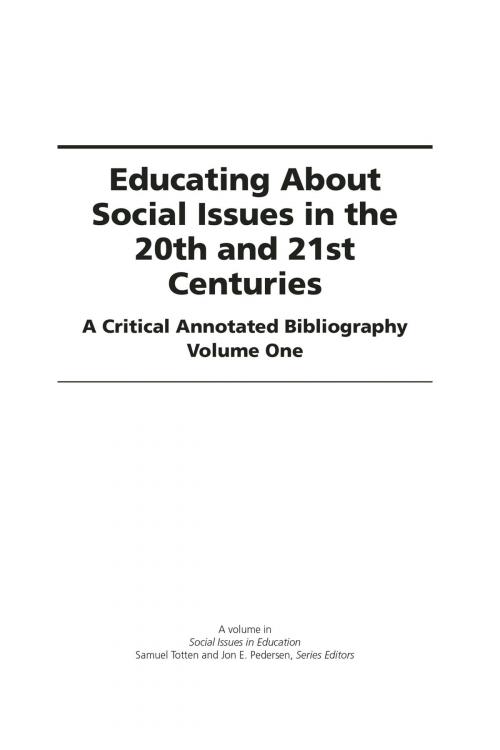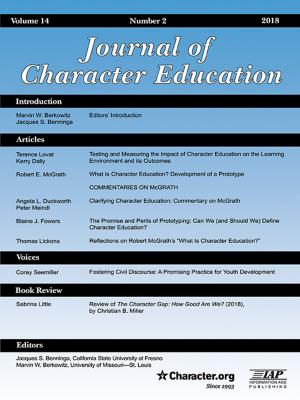Educating About Social Issues in the 20th and 21st Centuries Vol 1
A Critical Annotated Bibliography
Nonfiction, Reference & Language, Reference, Bibliographies, Education & Teaching, Social & Cultural Studies, Social Science| Author: | ISBN: | 9781617355745 | |
| Publisher: | Information Age Publishing | Publication: | April 1, 2012 |
| Imprint: | Information Age Publishing | Language: | English |
| Author: | |
| ISBN: | 9781617355745 |
| Publisher: | Information Age Publishing |
| Publication: | April 1, 2012 |
| Imprint: | Information Age Publishing |
| Language: | English |
Educating About Social Issues in the 20th and 21st Centuries: A Critical Annotated Bibliography, is comprised of critical essays accompanied by annotated bibliographies on a host of programs, models, strategies and concerns visàvis teaching and learning about social issues facing society. The primary goal of the book is to provide undergraduate and graduate students in the field of education, professors of education, and teachers with a valuable resource as they engage in research and practice in relation to teaching about social issues. In the introductory essays, authors present an overview of their respective topics (e.g., The Hunt/Metcalf Model, Science/Technology/Science, Genocide Education). In doing so, they address, among other concerns, the following: key theories, goals, objectives, and the research base. Many also provide a set of recommendations for adapting and/or strengthening a particular model, program or the study of a specific social issue. In the annotated bibliographies accompanying the essays, authors include those works that are considered classics and foundational. They also include research and practiceoriented articles. Due to space constraints, the annotated bibliographies generally offer a mere sampling of what is available on each approach, program, model, or concern. The book is composed of twenty two chapters and addresses an eclectic array of topics, including but not limited to the following: the history of teaching and learning about social issues; George S. Counts and social issues; propaganda analysis; Harold Rugg's textbook program; Hunt and Metcalf's Reflective Thinking and Social Understanding Model; Donald Oliver, James Shaver and Fred Newmann's Public Issues Model; Massialas and Cox' Inquiry Model; the Engle/Ochoa Decisionmaking Model; human rights education; Holocaust education; education for sustainability; economic education; global education; multicultural education; James Beane's middle level education integrated curriculum model; Science Technology Society (STS); addressing social issues in the English classroom; genocide education; interdisciplinary approaches to incorporating social issues into the curriculum; critical pedagogy; academic freedom; and teacher education.
Educating About Social Issues in the 20th and 21st Centuries: A Critical Annotated Bibliography, is comprised of critical essays accompanied by annotated bibliographies on a host of programs, models, strategies and concerns visàvis teaching and learning about social issues facing society. The primary goal of the book is to provide undergraduate and graduate students in the field of education, professors of education, and teachers with a valuable resource as they engage in research and practice in relation to teaching about social issues. In the introductory essays, authors present an overview of their respective topics (e.g., The Hunt/Metcalf Model, Science/Technology/Science, Genocide Education). In doing so, they address, among other concerns, the following: key theories, goals, objectives, and the research base. Many also provide a set of recommendations for adapting and/or strengthening a particular model, program or the study of a specific social issue. In the annotated bibliographies accompanying the essays, authors include those works that are considered classics and foundational. They also include research and practiceoriented articles. Due to space constraints, the annotated bibliographies generally offer a mere sampling of what is available on each approach, program, model, or concern. The book is composed of twenty two chapters and addresses an eclectic array of topics, including but not limited to the following: the history of teaching and learning about social issues; George S. Counts and social issues; propaganda analysis; Harold Rugg's textbook program; Hunt and Metcalf's Reflective Thinking and Social Understanding Model; Donald Oliver, James Shaver and Fred Newmann's Public Issues Model; Massialas and Cox' Inquiry Model; the Engle/Ochoa Decisionmaking Model; human rights education; Holocaust education; education for sustainability; economic education; global education; multicultural education; James Beane's middle level education integrated curriculum model; Science Technology Society (STS); addressing social issues in the English classroom; genocide education; interdisciplinary approaches to incorporating social issues into the curriculum; critical pedagogy; academic freedom; and teacher education.















